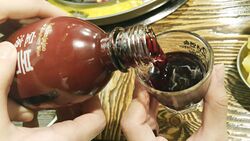Biology:Bokbunja-ju
 | |
| Type | Fruit wine |
|---|---|
| Country of origin | Korea |
| Ingredients | Bokbunja (Korean black raspberry) |
| Korean name | |
| Hangul | 복분자주 |
|---|---|
| Hanja | 覆盆子酒 |
| Revised Romanization | bokbunjaju |
| McCune–Reischauer | pokpunjaju |
| IPA | [pok̚.p͈un.dʑa.dʑu] |
Bokbunjaju (복분자주; 覆盆子酒), also called bokbunja wine, is a Korean fruit wine made from wild and/or cultivated bokbunja (Korean black raspberry). It is produced in Gochang County, Jeollabuk-do, in Damyang, Jeollanam-do,[1] and in Jeju Island, South Korea .[2] It is made by fermenting berries with water.[3][4] Some varieties also contain rice and jicho herb.[5]
The wine is deep red in color and moderately sweet. It ranges between 15% and 19% alcohol by volume, depending on the brand.[6] It is believed to be healthful [7] and to promote male sexual stamina.[8]
Since 2008, South Korean scientists have searched for ways to utilize bokbunja seeds, which are a by-product of bokbunja ju production. The carbonized seeds can be used as potential adsorbent for industrial dye removal from wastewaters.[9]
References
- ↑ "Daenamugol Bokbunja-ju 16%". Chusungkoul.en.ecplaza.net. http://chusungkoul.en.ecplaza.net/catalog.asp?DirectoryID=165171&CatalogID=805578. Retrieved 16 February 2015.
- ↑ Seoul. Books.google.com. https://books.google.com/books?id=fJbrVabqEhMC&pg=PA122&dq=bokbunja. Retrieved 24 January 2015.
- ↑ "Official Site of Korea Tourism Org.: Korean Traditional Liquor". English.visitkorea.or.kr. http://english.visitkorea.or.kr/enu/SH/SH_EN_7_3_2_4.jsp. Retrieved 16 February 2015.
- ↑ "All sizes — BokBunJa: Korean black raspberry wine — Flickr — Photo Sharing!". Flickr.com. https://www.flickr.com/photos/cristine/2300934379/sizes/l/. Retrieved 16 February 2015.
- ↑ "Jindo Bokbunja Hongju". Eckorea.ecplaza.net. http://eckorea.ecplaza.net/tradeleads/seller/5118033/jindo_bokbunja_hongju.html. Retrieved 16 February 2015.
- ↑ "Archived copy". Archived from the original on 2011-07-16. https://web.archive.org/web/20110716110509/http://www.agrafood.co.kr/contents/view.asp?category_code=0610&seq=1095&page=1. Retrieved 2009-03-28.
- ↑ "Official Site of Korea Tourism Org.: Korean Traditional Liquor". English.visitkorea.or.kr. http://english.visitkorea.or.kr/enu/SH/SH_EN_7_3_2_4.jsp. Retrieved 24 January 2015.
- ↑ "Fermentation Filtrates of Rubus coreanus Relax the Corpus Cavernosum and Increase Sperm Count and Motility". Liebertonline.com. http://www.liebertonline.com/doi/abs/10.1089/jmf.2007.0070. Retrieved 24 January 2015.
- ↑ Bokbunja Wine Industry Waste as Precursor Material for Carbonization and Its Utilization for the Removal of Procion Red MX-5B from Aqueous Solutions. Arthur Raj Binupriya, Muthuswany Sathishkumar, Sung Hun Jung, Sun Hwa Song and Soon-Il Yun, CLEAN – Soil, Air, Water, November 2008, Volume 36, Issue 10-11, pages 879–886, doi:10.1002/clen.200700202

